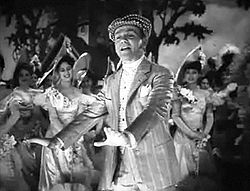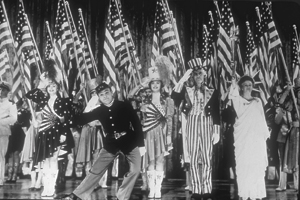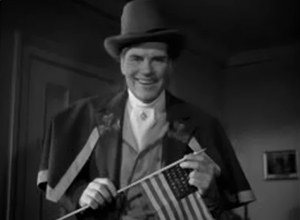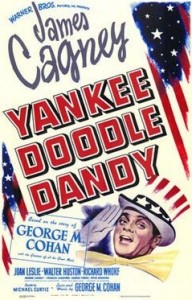The Yankee Doodle Dandiest Entertainment of ’em All!
To begin with a single “ideal” title from Warner Brothers’ new and delightful box-set of twenty great musicals made between 1927 and 1988, it would be as easy to select one as another. For me, already a difficult choice from among a half dozen favorites in this set, I would choose Yankee Doodle Dandy as an excellent starter. It was, after all, 1942 and the war, and America needed, as it does now, a little exuberant flag-waving.
Yankee Doodle Dandy is an artful blend of both nostalgia and good, old-fashioned patriotism.
The United States had been involved in World War II a little over a year, and, with this movie, what better way to highlight the man who had given the country—the world—perhaps the greatest fighting song of WWI, “Over There.” If the man himself was disliked more than most men, George M. Cohan was still one of the great tune-smiths. (Is that word still out and about?) Before WWI, he had already written “You’re A Grand Old Flag,” “Yankee Doodle Boy,” “Forty-Five Minutes from Broadway,” “Harrigan” and “Oh, You Wonderful Girl,” which are at the heart of this marvel of a musical.
Most of the non-Cohan songs in Yankee Doodle Dandy were written before the so-called “Great War”—maybe “great” only when there was just one world war!—including “While Strolling Through the Park One Day” and “Jeepers Creepers,” though no one is around now who remembers when these songs were new.
 Why so much emphasis on the songs? Why, that’s what musicals, especially this one, are all about. This is, after all, the story of a thoroughly, exuberantly musical family: George M. Cohan himself ([intlink id=”1551″ type=”category”]James Cagney[/intlink]), his father ([intlink id=”1043″ type=”category”]Walter Huston[/intlink]), his mother (Rosemary DeCamp), his sister (Jeanne Cagney, James’ sister) and the girl George married, Mary (Joan Leslie). Leslie had already contributed to the “war effort” the year before as the girlfriend of conscientious objector turned war hero, Alvin York ([intlink id=”900″ type=”category”]Gary Cooper[/intlink]), in Sergeant York, also a WB film.
Why so much emphasis on the songs? Why, that’s what musicals, especially this one, are all about. This is, after all, the story of a thoroughly, exuberantly musical family: George M. Cohan himself ([intlink id=”1551″ type=”category”]James Cagney[/intlink]), his father ([intlink id=”1043″ type=”category”]Walter Huston[/intlink]), his mother (Rosemary DeCamp), his sister (Jeanne Cagney, James’ sister) and the girl George married, Mary (Joan Leslie). Leslie had already contributed to the “war effort” the year before as the girlfriend of conscientious objector turned war hero, Alvin York ([intlink id=”900″ type=”category”]Gary Cooper[/intlink]), in Sergeant York, also a WB film.
“My mother thanks you, my father thanks you, my sister thanks you . . . and I thank you,” as George M. always says at the end of each family show—and they were, indeed, family shows.
 Forget that much on screen is inaccurate, especially Cohan’s presumed cheerful likeability. Despite its depiction in the final scene, Cohan never went to the White House to receive a patriotic award from a silhouetted Franklin Roosevelt (Art Gilmore): Cohan hated FDR. As for a racial embarrassment, there is the rendition of “The Battle Hymn of the Republic,” sung by African-Americans as if they had just come from the cotton fields.
Forget that much on screen is inaccurate, especially Cohan’s presumed cheerful likeability. Despite its depiction in the final scene, Cohan never went to the White House to receive a patriotic award from a silhouetted Franklin Roosevelt (Art Gilmore): Cohan hated FDR. As for a racial embarrassment, there is the rendition of “The Battle Hymn of the Republic,” sung by African-Americans as if they had just come from the cotton fields.
 The cast is full of familiar faces from the ’30s and ’40s, the standard comical or wicked supporting players people liked to love or hate: S.Z. Sakall, Walter Catlett, Frank Faylen, Joyce Reynolds, George Meeker, William Hopper, and Charles Drake. Even Eddie Foy, Jr., playing his famous vaudevillian father at the turn of the twentieth century, has a small part.
The cast is full of familiar faces from the ’30s and ’40s, the standard comical or wicked supporting players people liked to love or hate: S.Z. Sakall, Walter Catlett, Frank Faylen, Joyce Reynolds, George Meeker, William Hopper, and Charles Drake. Even Eddie Foy, Jr., playing his famous vaudevillian father at the turn of the twentieth century, has a small part.
Yankee Doodle Dandy is a jewel, not to be missed. How could it not be a jewel, then or now? It has going for it one of the great hoofers, James Cagney. Who can forget his dancing in “Yankee Doodle Boy,” kicking off the wall and sprinting across the stage with that bent-over, bow-legged prance. Not a great voice, perhaps, but the delivery, the rightness of the part, the enthusiasm—how exhilarating!
The director is [intlink id=”1579″ type=”category”]Michael Curtiz[/intlink], the guy who could direct anything—and did. The cinematographer is James Wong Howe. Curtiz was Oscar-nominated (unsuccessfully) for Yankee Doodle Dandy; Howe was nominated for another WB film that year, Kings Row.
Walter Huston threatens to steal Cagney’s fire, first in his race to the hospital in a police wagon and later in his dying scene, perhaps overly sentimental, but one of the classic film moments of its type. Huston was nominated Best Supporting Actor, but Cagney won for Best Actor.
In one scene in the film, Cohan smells breakfast cooking and asks Mary, “Ham or bacon?” “Bacon,” she replies. “Good,” he says. “Ham makes me self-conscious.” Clearly, an accurate moment in the film, as this screen Cohan, at least, obviously knew himself.
Thanks as always to Warner Brothers for the review copy.

Boy we love this post. But yes, we are also biased.